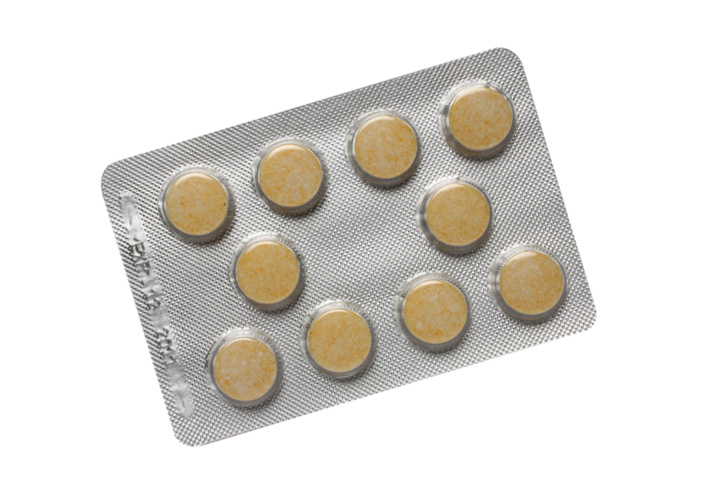Furadantin
Furadantine contain 100 mg nitrofurantoin. Nitrofurantoin is an antibacterial substance. Furadantine are used in the treatment of acute and chronic disorders of the urinary tract caused by germs sensitive to nitrofurantoin (e.g. inflammation of the bladder (cystitis) or inflammation of the renal pelvis (pyelitis)). It is also used to prevent infection during urological investigations, e.g. during bladder inspection or after urinary tract surgery.
What Does Furadantin Contain?

Active ingredients
1 capsule contains 100 mg nitrofurantoin
Excipients
Lactose monohydrate, gelatin, maize starch, talc, purified water, magnesium stearate, titanium dioxide (E171), quinoline yellow (E104), erythrosine (E127).
Forms and Strengths
Packs of 20 or 50 tablets.
Uses
It is up to your doctor to determine the dosage of Furadantine. Unless your doctor advises otherwise, the following indications apply:
Adults
Acute urinary tract infections
Take 1 capsule 2-3 times a day for 7-10 days.
Long-term treatment of chronic urinary tract infections
Take 1 capsule 1-2 times a day.
Children under 12 years of age
Furadantine are not suitable for the treatment of children under 12 years of age.
Swallow tablets with meals, without chewing, and with plenty of liquid.
Once started, treatment with Furadantine should be continued for as long as prescribed by the doctor. Neither the daily dose nor the duration of treatment should be changed without consulting your doctor or pharmacist. The symptoms of the disease may disappear before the infection is fully treated. Insufficient duration of use or premature cessation of treatment may lead to a resurgence of the disease.
Side Effects
In certain circumstances, the following side effects may be life-threatening. If any of the following symptoms occur, stop taking Furadantine immediately and seek medical advice without delay:
- hypersensitivity reactions, including severe allergic reactions up to anaphylactic shock, have been reported. Symptoms of shock may include cold sweats, difficulty breathing, a drop in blood pressure, rapid heartbeat, dizziness, and lightheadedness. Additionally, severe skin reactions such as Stevens-Johnson syndrome, toxic epidermal necrolysis, and drug hypersensitivity syndrome (DRESS), which can be potentially fatal, have occurred. Signs of a severe skin reaction include a significant worsening of general health, painful blisters in the mouth, throat, and genital area, joint pain, fever, and severe conjunctivitis.
- pulmonary reactions (interstitial pneumonia, allergic pulmonary oedema), manifested by breathlessness, difficulty in breathing which may even lead to respiratory distress, dry cough, asthma, chest pain and fever. In rare cases, these reactions may develop into pulmonary fibrosis (transformation of lung tissue into fibrous tissue) during long-term treatment with nitrofurantoin.
- inflammation of the liver, manifested by loss of appetite, jaundice, itching or abdominal pain. Liver function disorders (jaundice, biliary congestion).
Possible side effects are:
- Common side effects (affecting 1 to 10 people in 100):
- Dizziness, headache.
Occasional side effects (affects 1 to 10 people in 1000)
Nystagmus (uncontrollable rhythmic movements of an organ, most commonly the eyes), vomiting, abdominal pain and diarrhoea.
Nervous disorders (peripheral neuropathy, including inflammation of the optic nerve) with symptoms such as tingling in the hands and feet, pain, numbness in the hands and/or feet.
Depression, euphoria (feelings of intense happiness), confusion or other psychotic reactions, weakness, drowsiness and lack of strength.
Allergic pulmonary infiltration (known as nitrofurantoin pneumonia) with coughing fits, breathing difficulties and chest pain.
Rare adverse reactions (affecting 1 to 10 people in 10,000)
Allergic reactions such as anaphylactic shock, itching, rash, urticaria, swelling of the mouth and throat leading to difficulty in swallowing and breathing, angioneurotic oedema (swelling of the face).
Serious skin conditions such as exfoliative dermatitis (severe, widespread reddening of the skin), erythema multiforme (inflammatory skin disease with raised red patches), toxic epidermal necrolysis (life-threatening skin disease with detachment of the skin), erythema nodosum (inflammatory disease of the hypodermis with nodules).
Autoimmune reactions associated with chronic reactions of the lungs or liver.
Cristalluria (increased presence of crystals in urine sediment), various forms of anaemia (reduced number of red blood cells), changes in blood count, pancreatitis (inflammation of the pancreas), inflammation of the parotid glands (parotitis), reversible inhibition of spermatogenesis (formation of spermatozoa). temporary hair loss.
Liver disease such as jaundice, inflammation of the liver (cases of death have been reported).
Unknown frequency (cannot be estimated on the basis of available data)
Gastrointestinal disorders such as nausea and loss of appetite (up to anorexia).
Increased intracranial pressure (idiopathic intracranial hypertension).
Infections due to fungi or resistant bacterial germs.
Inflammation of the walls of small blood vessels, which can cause skin lesions (cutaneous vasculitis).
Inflammation of the liver, as the immune system fights against the liver cells (autoimmune hepatitis).
Kidney dysfunction due to what is known as interstitial nephritis, an inflammation of the kidneys.
Other hypersensitivity reactions include drug fever, joint pain (arthralgia) or drug hypersensitivity syndrome (DRESS).
Precautions
This medicine may affect reactions, driving ability and the ability to use tools or machines!
If you have already developed the side effects described below during previous treatment with nitrofurantoin (the active substance in Furadantine), you should inform your doctor before being prescribed this medicine again. Symptoms affecting the liver and skin should be reported in particular.
You should inform your doctor if you suffer from lung disease, liver dysfunction, kidney dysfunction, anaemia, diabetes mellitus, motor weakness or vitamin B deficiency.
Cases of hepatitis (inflammation of the liver) and necrosis of the liver, with a fatal outcome in isolated cases, have been described in association with Furadantine. The onset of chronic active hepatitis may be insidious. Your doctor should monitor your liver blood values regularly. In the event of hepatitis, the medicine must be stopped immediately and your doctor will take appropriate measures. If any of the following symptoms occur, stop taking Furadantine and consult your doctor immediately:
- a rapidly developing general feeling of weakness or lack of strength, loss of appetite
- yellowing of the skin, mucous membranes and eyes (conjunctiva)
- itching
- skin rashes
- joint pain
- pain-sensitive abdomen, nausea and vomiting
- light-coloured or grey stools.
Furadantine may cause a brownish discolouration of the urine (dark urine), which is harmless.
Isolated cases of particularly serious allergic reactions such as Stevens-Johnson syndrome, toxic epidermal necrolysis or drug hypersensitivity syndrome (DRESS) (potentially fatal) have been described when taking Furadantine. If any of the following symptoms occur, stop taking this drug and seek medical advice immediately:
- flu-like symptoms with skin rash and fever
- mucous membrane reaction: painful blisters in the mouth, throat and genital area
- feeling of tightness in the chest.
Furadantine has been associated with pulmonary side effects (interstitial pneumonia, pulmonary fibrosis), which can sometimes develop insidiously over several weeks or even months. If any of the following symptoms occur, stop taking Furadantine and seek medical advice immediately:
- breathing difficulties, respiratory distress
- cough (usually dry and unproductive)
- chest pain
- fever.
Peripheral neuropathy has been reported during treatment with Furadantine. If any of the following symptoms occur, stop taking this medicine and seek medical advice immediately:
- pain, burning, tingling
- numbness in the hands and feet
- dizziness and/or weakness.
Your doctor will also need to know if you are taking certain anti-infection medicines containing, for example, nalidixic acid, medicines that increase the excretion of uric acid (anti-gout medicines) containing the active ingredients sulfinpyrazone or probenecid, antiepileptic medicines containing the active ingredient phenytoin or products that block gastric secretion containing the active ingredient propantheline.
Simultaneous administration of certain antacids (medicines to combat gastric hyperacidity) such as magnesium dioxide, aluminium hydroxide and magnesium trisilicate reduces the absorption of nitrofurantoin. For this reason, nitrofurantoin should be taken at least one hour before the antacid.
Nitrofurantoin inactivates typhoid vaccines and inhibits the antibacterial activity of certain other drugs used in the treatment of urinary tract infections.
The simultaneous use of sodium bicarbonate, sodium lactate or other medicines that help to alkalinise the urine (making it basic) reduces the effect of nitrofurantoin.
Nitrofurantoin, like other antibiotics, can disrupt the intestinal flora, leading to a reduction in the efficacy of certain contraceptives.
Tell your doctor if you have to have blood or urine tests, as nitrofurantoin may affect the results of these tests.
Only take Furadantin after consulting your doctor if you know you have sugar intolerance.
What else do you need to consider?
This medicine has been prescribed for you by your doctor to treat the urinary tract infection you are currently suffering from.
The active ingredient in Furadantine is not effective against all the micro-organisms responsible for urinary tract infections. Using the wrong medicine or the wrong dose can lead to complications.
So do not use it on your own initiative to treat another condition, or even other people. Even if a new infection occurs, you should not use Furadantine without further medical advice.
When should Furadantine not be used?
Drug should not be taken in the following cases: limitation of renal function, reduction or absence of urine formation, nerve diseases such as diseases of the peripheral nervous system (polyneuropathy) or inflammation of a peripheral or cerebral nerve (neuritis), in the case of the rare hereditary disease affecting red blood cells called "glucose-6-phosphate dehydrogenase deficiency", specific damage to the lungs (pulmonary fibrosis), disturbances in the formation of red blood cells (acute porphyria) or known hypersensitivity (allergy) to nitrofurantoin or related substances. Such hypersensitivity is manifested, for example, by asthma, difficulty in breathing, circulatory problems, swelling of the skin (e.g. urticaria) or mucous membranes, or skin rashes.
Furadantine capsules are not suitable for children under 12 years of age.
Pregnancy and Breastfeeding
If you are pregnant or intend to become pregnant, you should only take Furadantine after consulting your doctor or pharmacist. Let your doctor or pharmacist decide whether you can take this drug during pregnancy.
During the first 6 months of pregnancy and up to 4 weeks before the expected date of delivery, you should not take Furadantine.
You should not breast-feed while taking Furadantine.



